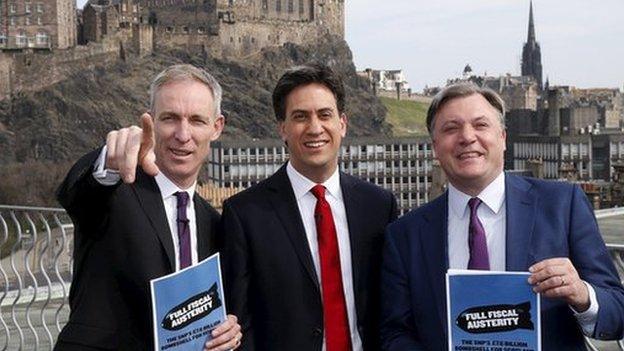Election 2015: Labour v Tories row over SNP intensifies
- Published
Ed Miliband: David Cameron "threatening the integrity" of UK by "talking up" SNP
Ed Miliband has accused David Cameron of "demeaning his office" and putting the UK's future at risk as a row over the SNP's future role intensifies.
The Labour leader said Mr Cameron, who has warned of the dangers of a Labour-SNP tie-up, should be "taking on the nationalists" not "talking them up".
He suggested other Conservatives were "ashamed" of their election strategy.
But former Prime Minister Sir John Major said the SNP could "blackmail" a future Labour government.
The Conservatives have continued their warnings about the SNP's likely influence on a minority Labour government in the event of a hung Parliament, with the former Conservative leader claiming it would be a "recipe for mayhem".
In other election news:
Labour would launch an emergency recruitment drive to get 1,000 more nurses into training this year if they win the election
Nick Clegg has said owners of second homes in rural beauty spots could pay double the rate of council tax under Liberal Democrat plans, while the party also launches its Scottish manifesto
As they launch their manifesto, the Democratic Unionists say they have not ruled out working with either the Conservatives or Labour to ensure stable government
The BBC should be "cut back to the bone" and the licence fee reduced by two thirds, according to UKIP's Nigel Farage
Scores of schools have sought to be removed from acting as polling stations because of the "disruption" caused
Sir John used a speech in the Midlands to say a Labour government would be subjected to a "daily dose of blackmail" from the nationalists.
But the line of attack has led to disquiet among some Scottish Conservatives, with former Scottish Secretary Lord Forsyth telling the Guardian, external the party's "short-term" focus on the SNP could backfire, boosting support for the nationalists and threatening the "integrity" of the union.
And former Conservative chairman Lord Tebbit told the BBC's Newsnight Mr Cameron's repeated warnings about the SNP were "puzzling", "pointless" and might even push Scots to vote tactically for Labour.
Mr Miliband - who has ruled out a Labour coalition with the SNP - seized on Lord Forsyth's comments, telling the BBC that Mr Cameron was "playing fast and loose with the union" and "setting England against Scotland".
John Major claims the SNP would deliver "a daily dose of blackmail" to a Labour government
"David Cameron should not be talking up a nationalist party in order to try and get them to do well in Scotland to take votes off Labour to try and crawl back into Downing Street," he said.
"He should be taking on a nationalist party as I am doing. David Cameron is now threatening the integrity of the UK with the games he is playing."
With 16 days to polling day, Sir John said the SNP were on course to win 40 seats and would seek to join Labour in an "anti-Conservative alliance".
"If Labour were to accept an offer of support from the SNP, it could put us on course to a government held to ransom on a vote-by-vote basis and we would pay the price," he said.
Health and care
Labour
Main pledges
- Extra £2.5bn funding for the NHS, to pay for 20,000 more nurses, 3,000 midwives and 8,000 GPs
- Repeal the Health and Social Care Act and cap the amount of profit private firms can make from the NHS at 5%
- Integrate NHS health care and social care
- End 15 minute care visits
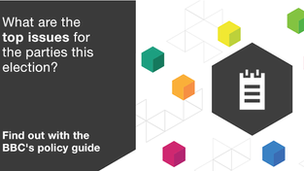
A minority Labour government, he argued, would be forced to accede to SNP demands or face collapse, adding that the SNP's desire to "prise apart" the UK posed a "real and present danger to our future".
"This is a recipe for mayhem. At the very moment our country needs a strong and stable government, we risk a weak and unstable one - pushed to the left by its allies, and open to a daily dose of political blackmail."
He also rejected the criticism from Mr Miliband, saying it was "nonsense... classic Labour spin".
Launching her party's manifesto, external in Edinburgh on Monday, SNP leader Nicola Sturgeon sought to allay the fears of some English voters, insisting they would act "responsibly and constructively" in the interests of the whole of the UK.
Speaking on Tuesday, she said Sir John Major's comments reflected Conservative concerns about their poll ratings and insisted the election was "not about independence but how Scotland gets its voice heard at Westminster".
'Cheerleaders'
Recent polls all point towards there being a hung parliament after 7 May, and suggest the SNP could be the third-largest party and crucially hold the balance of power.
As a consequence of this, the "threat" of an SNP link-up with Labour has emerged as a major Conservative line of attack during the campaign, with David Cameron making repeated references to it.

BBC News Timeliner: Scottish independence
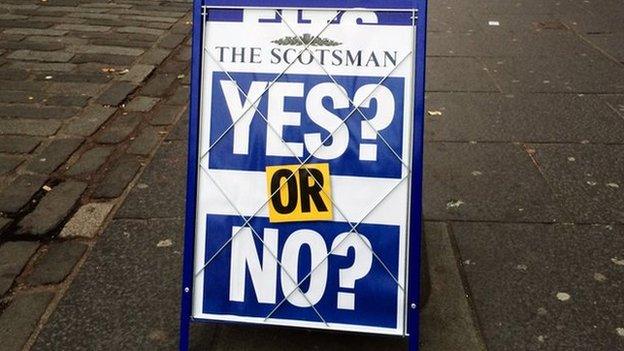
The relationship between politics in Scotland and in the United Kingdom as a whole has changed dramatically since the 1970s, as a quick delve into the BBC archives displays.
Watch video from the vaults on the BBC News Timeliner, external

The BBC's deputy political editor James Landale said the Conservatives were determined to keep up these warnings to bring any wavering voters back to the Tory fold but faced accusations that they were "acting as cheerleaders for the SNP".
The PM told BBC Radio 5 live his tactics were "about the economy of the country" not "party games".
He also said the Conservatives would vote "on principle not opportunism" in the event of a strengthened SNP challenging Labour over the Trident nuclear missile system - which it wants to scrap - in the next Parliament.

BBC News Timeliner: A Major surprise
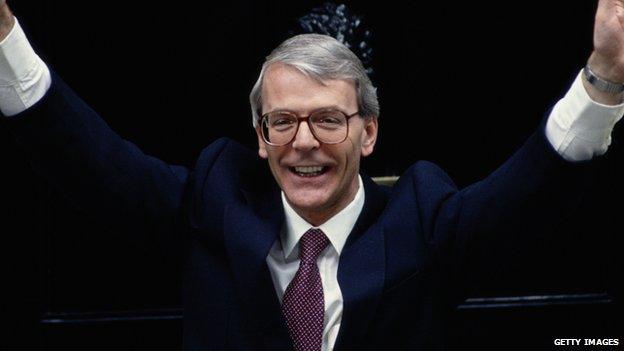
The result of the 1992 general election did not produce the predicted result, as a quick delve into the BBC archives displays.
Watch video from the vaults on the BBC News Timeliner, external

Former Liberal Party leader Lord Steel said the Conservatives' arguments were "rather odd", given they had supported a minority SNP administration in the Scottish Parliament between 2007 and 2011.
The Lib Dems have suggested a minority Conservative government could find itself dependent on a "Bluekip" alliance of centre-right parties, possibly including UKIP and the Democratic Unionists, which it says would make big cuts to public services.
And former Conservative chancellor Ken Clarke said voters should focus on the "serious" parties of government to avoid the "extraordinary set of circumstances" in which UKIP would have influence on a future administration, describing them as a "one-issue" party with "extreme" views on immigration.
Another ex-Conservative minister, Sir Malcolm Rifkind, told LBC that if he were voting in Scotland he would "think very hard" and consider voting for other unionist candidates to keep out the SNP in marginal seats.
UKIP parliamentary candidate and former Tory MP Mark Reckless said the intervention of Sir John Major, "the man who took us into the ERM" - the European Exchange Rate Mechanism, which was a precursor to the euro - was a "handy reminder" for many former Conservatives on why they "gave up" on the party.
- Published21 April 2015
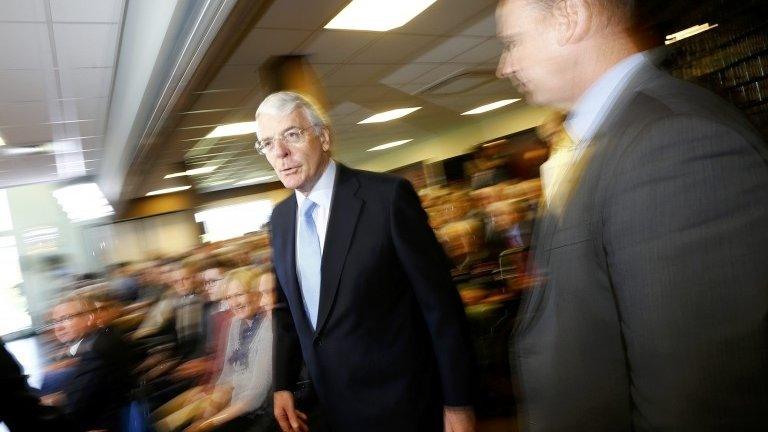
- Published20 April 2015
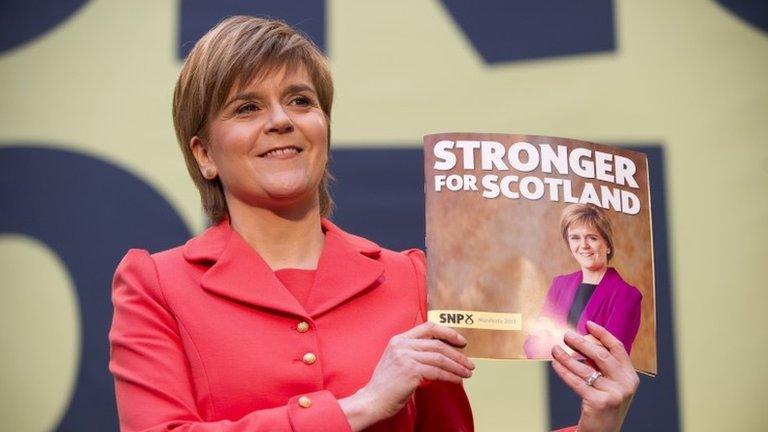
- Published20 April 2015
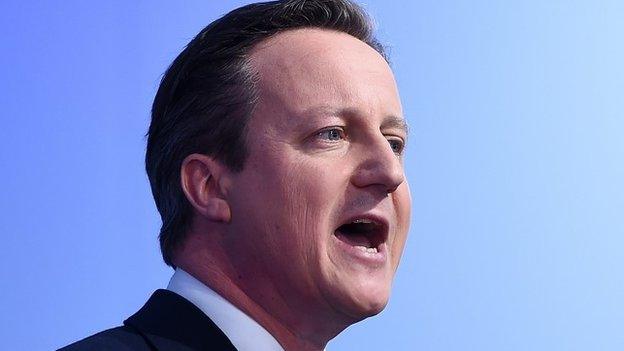
- Published20 April 2015
